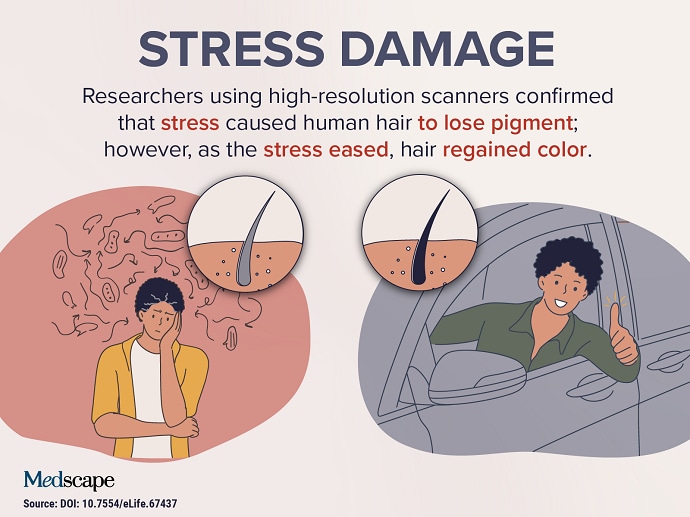Trending Clinical Topic: Stress Damage
No Results
No Results
Each week, we identify one top search term, speculate about what caused its popularity, and provide an infographic on a related condition. If you have thoughts about what’s trending and why, share them with us on Twitter or Facebook. Find the latest COVID-19 news and guidance in Medscape’s Coronavirus Resource Center.
Scientific confirmation of a long-held theory, as well as new research into an association with Alzheimer’s disease, helped put stress in the spotlight, resulting in this week’s top trending clinical topic.
Although gray hair is often jokingly referred to as “stress highlights,” the connection between personal pressure and pigment changes has been difficult to prove, until now. Researchers measured color loss in single strands of human hair from volunteers who kept diaries to document the weekly levels of stress they experienced (see Infographic below). Using high-resolution scanners, the team captured images of hair fragments so tiny that they represented 1 hour’s growth. When hair color changed, the team saw variations in 300 proteins. This allowed them to develop a mathematical model to predict what may happen to hair over time and identify a point in time when those changes are reversible.
A separate review of human and animal epidemiologic studies found that long-term stress, along with genetic factors, may contribute to the development of Alzheimer’s disease. Stress activates the hypothalamic-pituitary-adrenal (HPA) axis, which regulates bodily levels of cortisol in response. Increased cortisol levels are frequently observed in patients with Alzheimer’s disease and “make a major contribution to the disease process,” the authors wrote. Moving forward, the researchers plan to further investigate the molecular mechanisms responsible for the role of stress in Alzheimer’s disease and how genetic variants affect neurodegeneration. Ultimately, understanding how stress contributes to the disease’s development may lead to the identification of therapeutic targets.
Alleviating stress is a major concern for many, especially during the ongoing pandemic. Nearly 1 in 4 adults said they managed pandemic-related stress by drinking more, according to an American Psychological Association survey released in February. For a much healthier alternative for stress relief, many have recently turned to acupuncture. Studies have shown that COVID-19 causes a cytokine storm that results in inflammation capable of killing tissue and damaging organs. A study from Harvard Medical School in 2020 found that acupuncture reduced the impact of cytokine storms in mice. A separate study found that acupuncture treatment for COVID-19 suppressed the inflammation caused by stress, improved immunity, and regulated nervous system functions.
Stress that leads to burnout was a problem for physicians long before the pandemic began. Experts continue to emphasize the need for doctors to incorporate self-care and wellness into their routines moving forward. The importance of protecting mental well-being in healthcare professionals is more evident than ever. However, the damage that stress can do is not limited to mental health, as is evident by the studies that resulted in this week’s top trending clinical topic.
Take a short quiz on stress-related conditions.
Medscape © 2021 WebMD, LLC
Any views expressed above are the author’s own and do not necessarily reflect the views of WebMD or Medscape.
Cite this: Ryan Syrek. Trending Clinical Topic: Stress Damage – Medscape – Jul 23, 2021.
Senior Editor, Medical Students, Medscape Drugs & Diseases
Disclosure: Ryan Syrek has disclosed no relevant financial relationships.
You have already selected for My Alerts
Click the topic below to receive emails when new articles are available.
You’ve successfully added to your alerts. You will receive email when new content is published.
processing….
Trending Clinical Topic: Stress Damage
Research & References of Trending Clinical Topic: Stress Damage|A&C Accounting And Tax Services
Source

